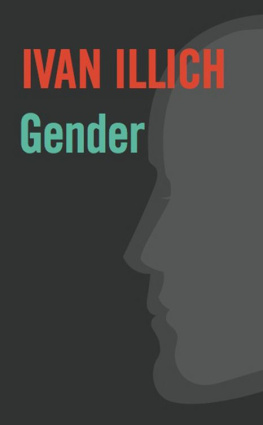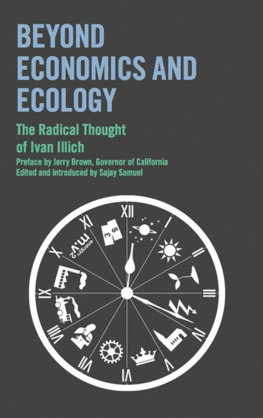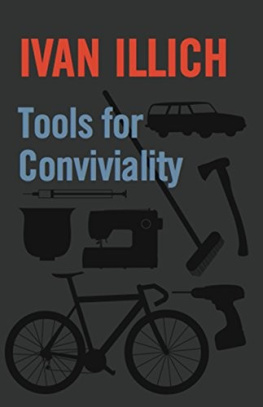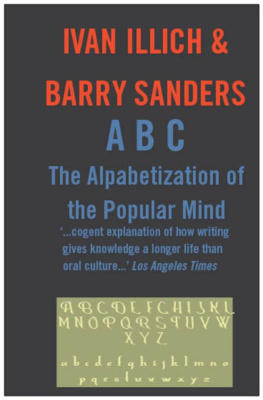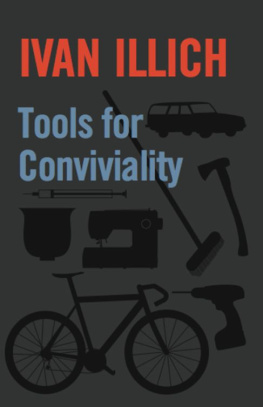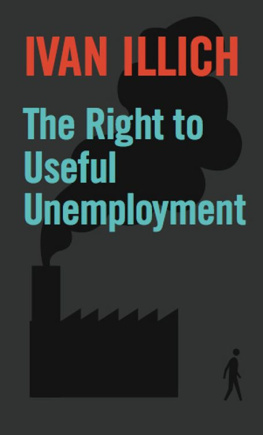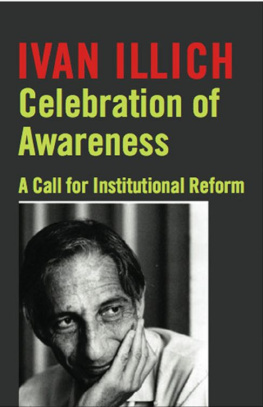IVAN ILLICH IN CONVERSATION
Also by David Cayley
The Age of Ecology
Northrop Frye in Conversation
George Grant in Conversation
The Expanding Prison
The Rivers North of the Future
IVAN ILLICH IN CONVERSATION
David Cayley

Copyright 1992 David Cayley
All rights reserved. No part of this publication may be reproduced or transmitted in any form or by any means, electronic or mechanical, including photocopying, recording, or any information storage and retrieval system, without permission in writing from the publisher.
First published in 1992 by House of Anansi Press Ltd.
This edition published in 2007 by
House of Anansi Press Inc.
110 Spadina Avenue, Suite 801
Toronto, ON, M5V 2K4
Tel. 416-363-4343
Fax 416-363-1017
www.anansi.ca
Distributed in Canada by
HarperCollins Canada Ltd.
1995 Markham Road
Scarborough, ON, M1B 5M8
Toll free tel. 1-800-387-0117
Distributed in the United States by
Publishers Group West
1700 Fourth Street
Berkeley, CA 94710
Toll free tel. 1-800-788-3123
CBC logo used by permission
House of Anansi Press is committed to protecting our natural environment. As part of our efforts, this book is printed on Rolland Enviro paper: it contains 100% post-consumer recycled fibres, is acid-free, and is processed chlorine-free.
11 10 09 08 07 2 3 4 5 6
LIBRARY AND ARCHIVES CANADA CATALOGUING IN PUBLICATION DATA
Illich, Ivan, 1926
Ivan Illich in conversation
ISBN-13:978-0-88784-524-6
ISBN-10:0-88784-524-X
1. Illich, Ivan, 1926-. Interviews. 2. Education Philosophy.
3. Social problems. 4. Medicine Philosophy.
I. Cayley, David. II. Title.
LB885.I5A5 1992 370.1 C92-093286-X
Library of Congress Control Number: 2007923905
Cover design: Brant Cowie / ArtPlus Limited
Typesetting: Tony Gordon Ltd.

We acknowledge for their financial support of our publishing program the Canada Council for the Arts, the Ontario Arts Council, and the Government of Canada through the Book Publishing Industry Development Program (BPIDP).
Printed and bound in the USA
Contents
Preface
In 1968, in a folder of conference materials distributed by the Canadian University Service Overseas (cuso) to its returned volunteers, I discovered a paper by Ivan Illich. Illich then directed the Center for Intercultural Documentation (CIDOC), in Cuernavaca, Mexico, whose avowed purpose was to subvert the contemporary crusade for international development and discourage the sending of volunteers to what were then called developing countries. The paper recorded a talk he had given earlier that year in Chicago to a group of young American volunteers in which he told them, in so many words, to stay home. My superiors at CUSO may have felt that as Canadians we were not included in this injunction, but I took it seriously nonetheless.
At the time I had just returned from a Chinese village in northern Borneo where for two years I had served as a volunteer teacher. A juvenile infatuation with the mystic East had as much to do with my being there as a concern for international development, but the experience had still left me perplexed and unsettled. The village of Kwong Hwa where I lived had recently seen its school converted from Chinese- to English-language instruction. The CUSO volunteer was there to help in the integration of the village school into the Malaysian school system. This made me an unwelcome presence to that part of the community which did not see the abandonment of the Chinese curriculum as progress and disposed me to raise questions about the sense in which my being there constituted development. Illichs writings were the precipitant around which my questions coalesced.
In 1969, I visited Illich in Cuernavaca, and the next year, along with a group of friends, was able to bring him to Canada for what proved to be the last of the great international teach-ins at the University of Toronto. His talk focussed on the emerging question of the environment. He argued that unless the degradation of nature was met by a fundamental change in the orientation of modern societies, environmentalism would only end up spawning a new set of tutelary institutions staffed by a new set of experts in the surveillance and management of daily life. The consequences he predicted now surround a citizenry that has learned to accept that social policy should be based on expert calculations of how far nature can be safely pushed.
To assist me in preparing these programs, the conference organizers had obliged the invited speakers to do a recorded interview with me at some point during their stay. I accosted Illich in the lobby of the Windsor Arms Hotel before the conference started. He said that the interview I requested was against his inclination and that he would do it only in deference to his hosts. I recorded the conversation in his room and returned to the temporary studio I had set up in the basement of Emmanuel College, where the conference was to take place. I had checked the tape recorder before beginning the interview and monitored the recording throughout; but, when I put the tape on again, I discovered that it had nothing on it.
Later in the day I approached Illich and made my discomfiture known to him. He hinted that he had hexed the recording and then turned away to greet an old friend. This suggestion, which his magus-like appearance and reputation made at least plausible, left me even more disconcerted. However, I had a job to do, and I doggedly courted Illich until he finally agreed to record a second interview. Our conversation warmed during this second encounter, and, in the course of a discussion of the fate of his ideas on education, I mentioned to him that my three youngest children had never been to school. I then proposed that he allow me to prepare a major radio series based on his ideas, a scheme that I was already incubating when I learned that he was coming to Toronto. He said that he had refused all interviews for more than fifteen years but that, if I wished, I could write to his colleague Wolfgang Sachs about my idea.
The following day I had a chance to introduce Illich to my children, who had come to Emmanuel College to meet me following the conference. I then made my proposal to Wolfgang Sachs as instructed. Several months later I received a reply from Illich. It appeared to have been typed with one hand on the wrong keys of the typewriter, but I was able to make out the unaccountable fact that he had agreed. (He said he had been moved to do so by the feeling he sensed between my children and me.) Later we spoke on the phone, and he told me that he would make himself obedient to me. He was as good as his word, but what an interesting and refractory obedience it turned out to be.
I arrived in State College, Pennsylvania, where Illich teaches for part of the year at the Pennsylvania State University, in September of 1988. At the time Illichs household was taken over by what he and an attempt to mark the end of the development era with an anatomy of its key concepts.) From the midst of this gathering, in which I was made welcome and free to participate, Illich and I retired at least once a day to record our interview.
My intention was to survey Illichs thought, and, to this end, I had carefully reread all of his published works. I quickly learned that this was going to strain Illichs promised obedience. He wanted to talk about what was on his mind at the moment, rather than be taken step by step through books he had written ten or twenty years before. I was reluctant to forsake my plan and the structure it promised to give to the programs I would eventually have to produce. This tension became one of the constituents of our conversation.
Next page

